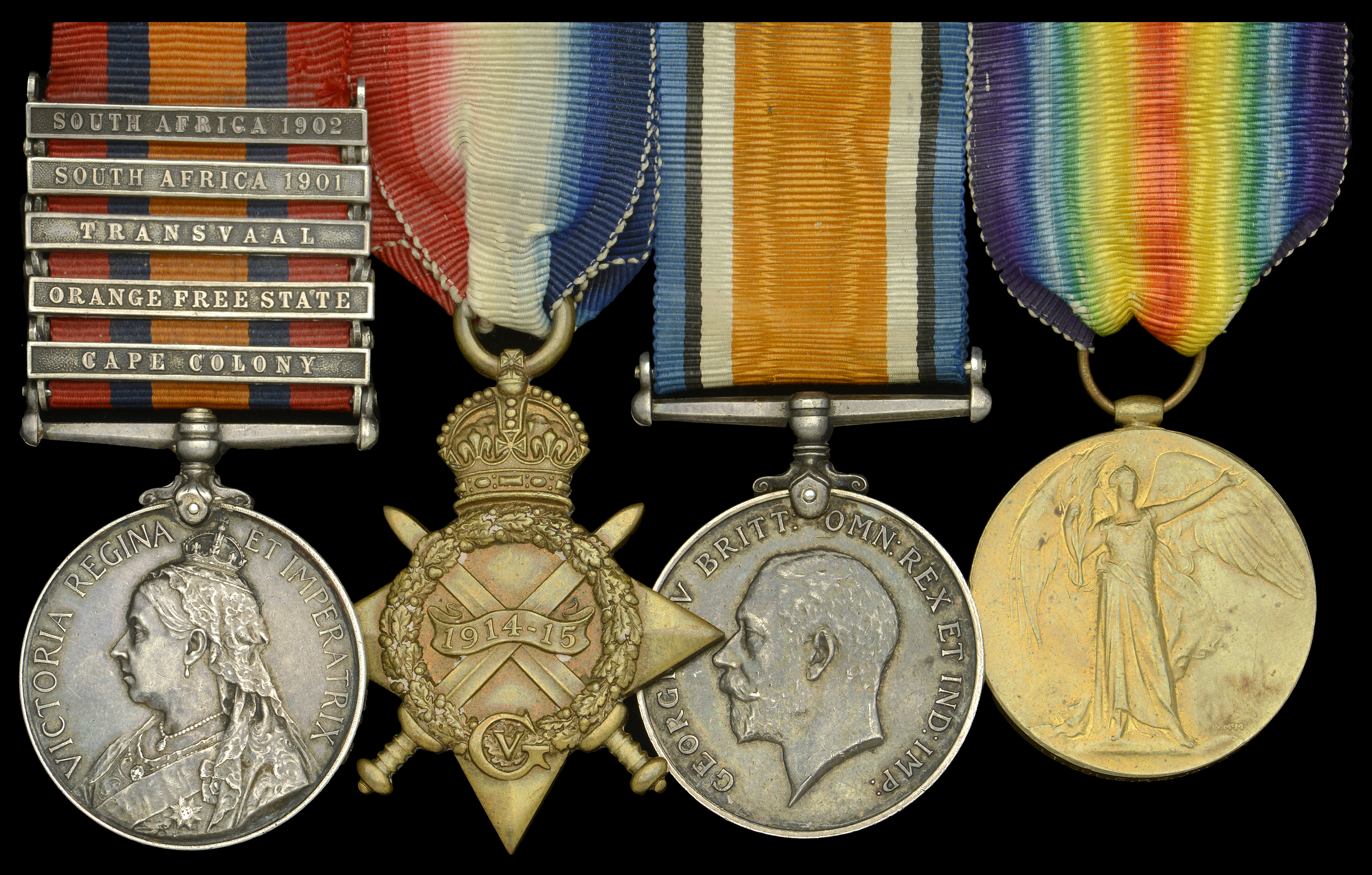Four: Colonel G. P. R. Jacques, South Nottinghamshire Hussars, who three times ‘came a cropper’ atop a horse, and faced peril when a fellow Officer threatened to shoot him after his wife ran away with Jacques Queen’s South Africa 1899-1902, 5 clasps, Cape Colony, Orange Free State, Transvaal, South Africa 1901, South Africa 1902, unofficial rivets between State and date clasps (2671 Pte. G. P. R. Jacques, 23rd. Coy. 8th. Imp: Yeo:); 1914-15 Star (Capt. G. P. R. Jacques. S.Notts. Hrs.); British War and Victory Medals (Lt. Col. G. P. R. Jacques.) mounted as worn, good very fine (4) £600-£800 --- George Philip Rigbye Jacques was born in the Parish of Westhoughton, Bolton, on 9 October 1878. Educated at Rossall School, he spent his teenage years at Orlingbury Hall in Wellingborough, before serving with the Imperial Yeomanry in South Africa from June 1900 to July 1901. Advanced Lieutenant in the 32nd Imperial Yeomanry in January 1902, he transferred as Captain to the Nottinghamshire Yeomanry (South Nottinghamshire Hussars) in December 1904 and was posted to France on 5 April 1915. Sent to the Western Front, Jacques’ Officer Service Record shows that he was dismounted from horses on 23 September 1915 and 25 July 1917, the latter incident resulting in a fracture to the pelvis and a ruptured kneecap. Evacuated to hospital in London, Jacques spent nine months in recovery, much of this time being at his second home in Gayfere Street, Westminster. Posted to the Egyptian Expeditionary Force in September 1918, he was raised Major and placed in command of the P.O.W. camp at Quesna. Raised Lieutenant-Colonel, he commanded the Russian Camp at Tel-el-Kebir from 1 March 1920, before returning home per H.M.T. Czarita. Transferred to the Defence Force, attached 7th Battalion, Sherwood Foresters, he finally bowed out from service on 9 October 1928 but remained on the Reserve of Officers; with war looming in 1939, Jacques was quick to offer his services to the War Office: ‘If I can be of service anywhere, any rank, any time, I am at your command!’ To have managed to survive until 1939 was something of an achievement for Jacques given his complex personal life. Analysis of the contemporary press shows that he became a little too close to the wife of Major Frederick Josiah Wright Clements of Hill House, Warwickshire; the Major later petitioned for the dissolution of his marriage on the grounds of the misconduct of his wife, Mrs. Dora Clements, formerly Goodman, with Lieutenant-Colonel Jacques. The undefended suit between two high ranking officers soon caught public attention: ‘He [Clements] lived with his wife at the Regina Hotel, Alexandria. There he met co-respondent [Jacques], who visited him and his wife at the hotel. He first complained of his wife’s attentions to co-respondent in March, 1920, while on a visit to the tombs at Luxor. She promised not to see him anymore. In May 1920, he went with his wife to a fancy dress ball in Alexandria. He next saw her at 1 a.m. in the supper room with Jacques... She promised not to see him again. A short while later the two men met up and parted on good terms. Mrs Clements branded her husband ‘a jealous old fool!’ Returned to his role in command of the Remount Squadron, the one thing Clements could not be branded was a ‘fool’; he soon caught his wife once more with Jacques, this time enroute to England aboard a passenger ship. The Kenilworth Advertiser of 5 March 1921, adds: ‘While staying at the Tudor Hotel in London, two detectives told him [Major Clements] they had a warrant for his arrest. They said he had threatened to commit murder. He had said in a letter to his wife that he would shoot the Colonel.’ Invited to Scotland Yard, it soon became clear that Clements was simply making threats, rather than actively planning in his rival’s demise. Nevertheless, his wife had clearly had enough and was keen to have her side of the story published in the same newspaper: ‘Dear Fred - Although I do not want to go into details, I think it is right to say that, owing to the unhappiness of our married life during the past years (of which you were the cause), I fully made up my mind when I left you last May in Alexandria that I would never live with you again... The reproaches and insinuations you made before I left with Colonel Jacques were then entirely unfounded, but since I have become very much attached to him owing to his great kindness to me... and I know that you will not be surprised at my telling you that we have been living as husband and wife at 29, Half Moon Street. I beg that if you wish to communicate with us you will do so through my solicitors - goodbye.’ Having survived the attentions of an angry ex-husband and weight of two cavalry steeds during the Great War, Jacques was felled again in 1926 when his mount Stonebow fell at a meeting. Suffering a fractured collar-bone and broken hand, he was evacuated to Holly Lodge, Stamfiord Bridge. He later rode with the Belvoir Hunt and it was during one of their meetings that he collapsed and died in March 1950.





